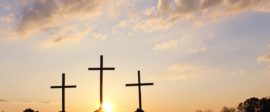New Beginnings
Blog / Produced by The High Calling
The horrendous tragedy of the September 11 terrorist attacks began a new era in America and the world. Many still speak of the change in the American spirit. Tragedy has brought forth solidarity; mourning for our losses a new appreciation for our common inheritance; and mass destruction has provoked a far greater civility.
The terrorists saw September 11 as all about judgment. They wanted the world's imagination to be taken with their own judgment of America as the enemy of Allah. America's military and commercial power, symbolized by the World Trade Center and the Pentagon, supposedly opposed the efforts of Muslims to create just societies through the practice of Islam. The attacks had the dual purpose of crippling the terrorists' enemy and transforming America's images of might into images of destruction, revealing (to the terrorists' condemnatory way of thinking) their true character. They then celebrated the demolition and death they had wrought.
The American people looked at the event and its images through diametrically different eyes. Very quickly, Americans were not entranced with the terrorists' images of destruction; they found the events' images of life far more compelling. They saw heroic fire fighters and police rushing into burning buildings to save lives. They took to their hearts smiling snapshots of the missing Pentagon and World Trade Center workers—people who had last been seen going to work. They began to grieve with the grieving.
Then, night after night, they watched live pictures of the clean-up effort at "ground zero" in Manhattan. They fell in love with stories about neighborhood bar and grills dishing out food to the hungry relief workers. It meant a lot that ministers and priests walked beside the relief workers to comfort them. Those who could not personally be part of the rescue effort gave an unprecedented amount of money to redress this horrific wrong.
The American people's concentration on the living, who had lost so much, and those who were doing so much, brought about a massive change in crucial underlying attitudes. The police, so often vilified as the oppressors of minorities, emerged in their true character as protectors of the innocent. Likewise, the legitimacy of the military and its role in defending the country from hostile powers was never more apparent. The capitalists who make markets and enable America's dynamic economy to create wealth for the nation (and the rest of the world as well) became sympathetic figures for the first time in memory. A president whose election evolved into a legal, technical wrangle became the admired commander-in-chief in New York boroughs where, as the mayor joked, "No one voted for him."
The terrorists must have hoped that their act of judgment would exacerbate the underlying tensions in American society—the traditional critics of the police, the Defense Department, capitalist America, and America's leaders would become even more bitter. Instead, vast numbers of people saw others they either feared or hated in a totally different light. They saw them as redeemers of wrong-doing and nurturers of life. And in this light they could forgive them for past sins or write the sins off as of no account. Because of September 11, America underwent a profound experience of forgiveness and reconciliation. We re-thought the class warfare terms that so often characterize our public dialogue.
So many new beginnings start with forgiveness. They can be as simple as a husband reaching out his hand to his wife after a spat and the wife giving that hand a squeeze to say, "Yes, you're forgiven." In the past year, we've all grasped hands.











